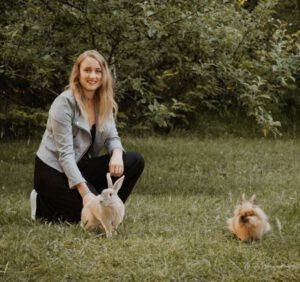Contents
Aggressive Behaviour towards the owner
“My rabbit hisses, growls and/or bites me!”
Aggressive Behaviour towards the owner can have many reasons. Try to observe your rabbit’s behaviour closely in order to find out about the reasons for its aggressions.
The most common reason is, however:
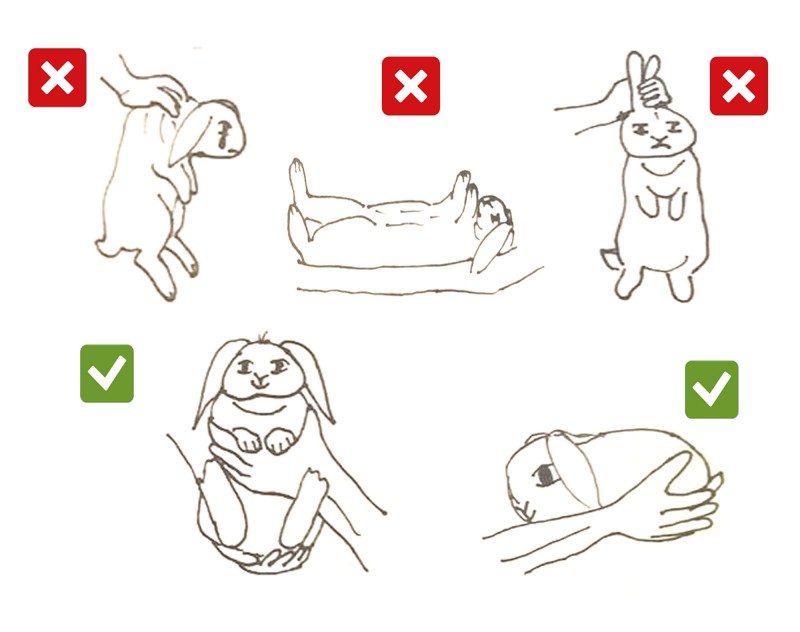
- Keeping your rabbits in a way that does not allow it to exercise properly, which leads to frustration and a lack of stimulation (e.g. confinement to cages/hutches instead of a big enclosure 24/7)
Rabbit housing - Missing partners
- Wrong handling of the rabbit (lifting up, carrying around, cuddling, crowding)
Under the condition of living in a big enclosure together with a partner and with stimulation via proper activities, almost all rabbits, provided that you give them some time, will return to normal behavior within a few days.
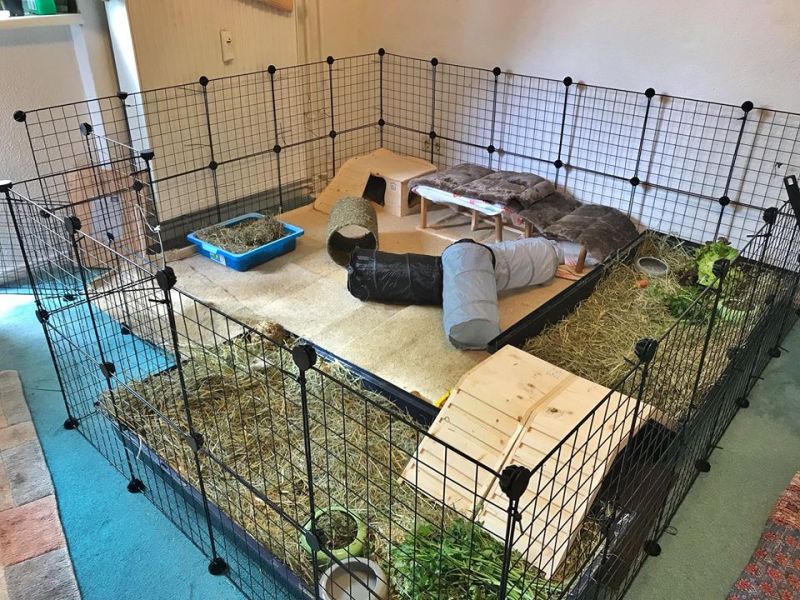
indoor cage 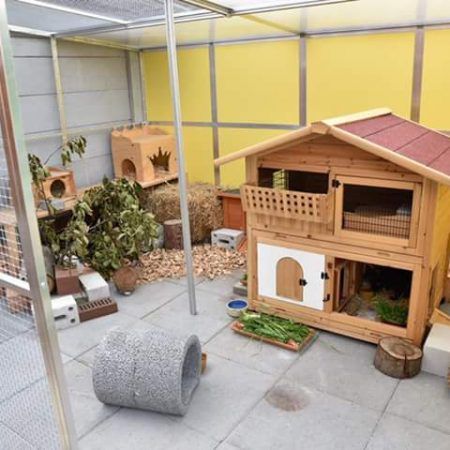
outdoor cage 
living on the balcony
Read the linked sub-pages thoroughly in order to optimize the keeping of your rabbit, finding a proper partner and learn how to domesticate your rabbit without scaring them (otherwise they often show anxiety-aggressive behaviour in order to be left alone!).
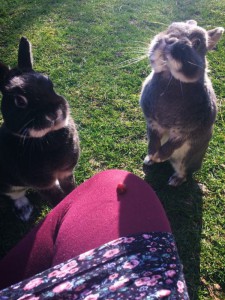
For the rabbit to associate the owner with something positive, one should approach the rabbit on eye-level and provide treats or preferred food. The rabbit should not be cornered, disturbed or forced, the rabbit should approach the owner despite enough space and possibilites to evade the situation.
If the rabbit continues to show problematic behavior despite the improvement of conditions and having a partner, despite neither cornering, nor scaring him, but slowly and carefully approaching him, bending down and moving slowly, then the behavior is probably trained and the rabbit needs retraining. Therefore, the owner should request help from experienced rabbit owners.
Possible Reasons:
Body Language (Nibbling, pushing away)
Nibbling and Pushing of conspecifics are part of the regular body language of a rabbit. In doing so, nobody is hurt. This behavior is commonly transferred onto the owner as well. Often, rabbits pull shoes or trouser legs to attract attention or beg for food. The rabbit understands it as a form of communication.
Anxiety-Aggression (Biting when there is no opportunity to hide)

In case rabbits feel cornered, they either freeze or attack. If a rabbit feels threatened, it might possibly bite. Threatening situations occur when owners approach the rabbits in a wrong way, (the right way of handling your rabbit), e.g. from above or in another scary way. In Addition, bad experiences can lead to anxiety-aggression. When the rabbit is scared to be picked up, carried around or being cuddled, it might show aggressive behavior, as well. Rabbit prefer to stay on the ground and being cuddled there. Being picked up and being fixated causes anxiety, which is why a rabbit bites. Do not corner your rabbit but approach it with respect and leave with an opportunity to evade, when you pet it.
Territory defense
Some rabbits tend to defend their food, their bowls or their enclosure. When someone enters and fills up food, they will bite furiously. This behaviour is especially common in rabbits kept alone or in cages. Furthermore, non-neutered bucks show this form of behaviour. The behaviour can be fixed by neutering bucks, finding partners for single rabbits and enlarge the enclosure. Adding new bowls and distributing and hiding the food all over the enclosure helps as well, since there is no single “food spot“ the rabbit might defend. Furthermore, adding a big digging box, in which the rabbit can get rid of his aggressions, could help. Change the setting of the defended space by creating new hiding spots and change the setting of the litter box.
Frustration Aggression
This form of aggression is a redirected form of frustration. The rabbit is not fully engaged or needs something else for his basic needs, which he expresses in showing aggressive behavior. The main reason for frustration aggression is generally low stimulation. Rabbits need plenty of change, stimulation by the environment, social interaction with other rabbits, space to exercise, a digging box and space to roam. It is difficult to adjust the „typical“ forms of keeping your rabbit to these needs. To get rid of frustration aggression, bond your rabbit with another rabbit, build a big enclosure with at least 6 sqm (=64,5835 sqft) and daily exercise, a digging box, daily roaming space and change. Further reason can be missing hiding spots (in which the rabbit feels properly safe), mishandling and teasing by children, annoyance of younger rabbits when their older partner rabbit starts to show signs of old age and illness, so that they cannot keep up with the interactions between them. The frustration can be projected upon the senior rabbit. This is why it is important to bond rabbits of a similar age and level of activity.
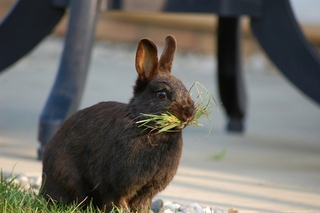
Sexually frustrated
Rabbits Sexually frustrated rabbits (unneutered bucks, unneutered females during false pregnancy, rabbits with hormonal disorders) suffer from an excessive sexual behavior, which shows in a frustration aggression. The rabbit suffers from an exceed in hormons, which it cannot compensate. They should be neutered as soon as possible.
Trained Aggressions
Someday, your rabbit tried to bite and realised, you would recoil (understadably). Some rabbits learn to bite everything that is in their way or bothers them. The only way to fix this behaviour is by reacting differently the next time, in order for the rabbit to learn that biting will not lead to anything. Do not touch your rabbit. Buy a soft brush (evtl. with a longer grip) and pet your rabbit carefully with it. If it bites the brush, do not pull back but leave the brush in place. Allow your rabbit to retreat if it shows signs of fear. Repeat the brushing procedure twice a day until the behavior improves and you can pet you rabbit with your hands. An alternative to a brush would be thick gloves.
Pain
Pets react grumply to their surrounding and aggressive towards being approached and touched if it feels unwell. Even biting might occur. For female rabbits this is often the case for uterine affections, which cause severe pain but do not show visible symptoms. For lops it is often invisible infections of the deeper inner ear. Another cause of pain are often dental root affections! After treatment and pain relief, aggressive behavior vanishes, too. If the initial cause of pain cannot be determined, consulting your vet and administering pain medication (Metacam) in a high dosis for a few days could be worth a try. During that time observe the rabbit’s behaviour closely. If the aggression is pain-related, an improvement should be visible. If it is a behavioural issue, the rabbit won’t show any difference.
False pregnancy
Female rabbits have reoccuring seasonal phases of phantom pregnancy (building of nests, ripping off fur, carrying around hay, grass, digging, aggressions, grumpiness). These phases, including the resulting aggressions, should be over after some days. The rabbit will be back to normal afterwards. During these phases a big digging box to cope with aggressions helps. Otherwise, it is best to leave your rabbit to it and wait until ist phase is over. Further tips
Mistaken for Food
In rare occurrences, your rabbit might mistake your finger for food, especially when your rabbit is greedy. Then it might accidentally get a hold on your finger.
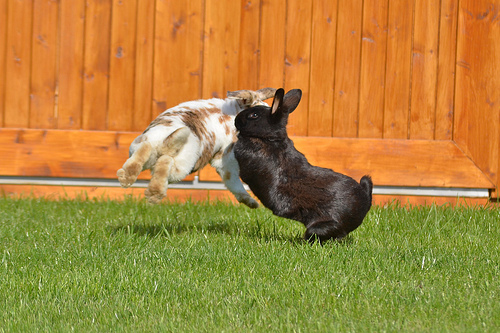
Aggressions when disturbing a fight between two rabbits
It is a bad idea to disrupt a fight between two rabbits with your bare hands. The rabbit might get a hold on you (although the intention was to bite the other rabbit).
Aggressive behavior towards other rabbits
“My rabbit does not get along with other rabbits”
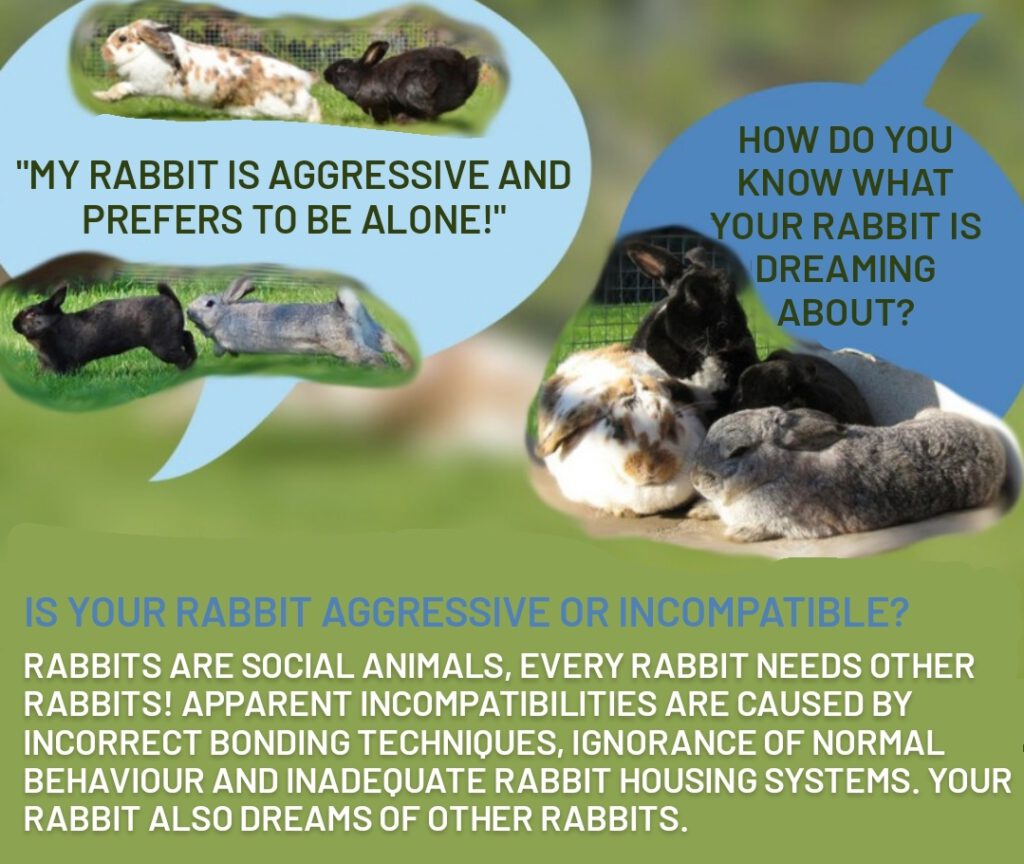
The social behavior of rabbits is not easy, it is vital to be well informed to bond strange rabbits. Therefore, it often happens that owners have issues with „apparently incompatible” rabbits, which do not want to bond, are aggressive or “prefer to live alone”.
Generally, one can say that rabbits are extremely social animals, there are no ‘incompatible’ rabbits. We do regularily take in incompatible rabbits for bonding or re-homing and not once a rabbit has actually been anti-social, all have found a suitable partner.
But why do some rabbits seem to not get along with each other?
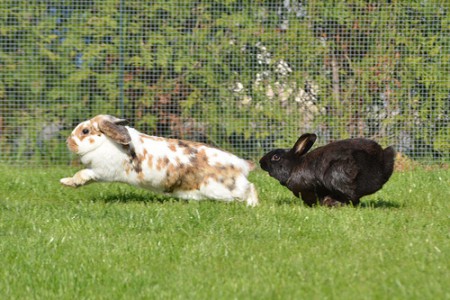
- Ignorance of regular bonding behavior (fights, humping, chasing etc. are regular forms of behavior and serve the purpose of establishing a hierarchy, aggression at the bars are normal as well! Rabbits can be extremely territorial!
- Wrong method of bonding, neglecting bonding rules (Common Bonding Mistakes, Course of Bonding)
- The partners of choice are not a suitable pairing (young vs old, same-sex, take a look at partner selection)
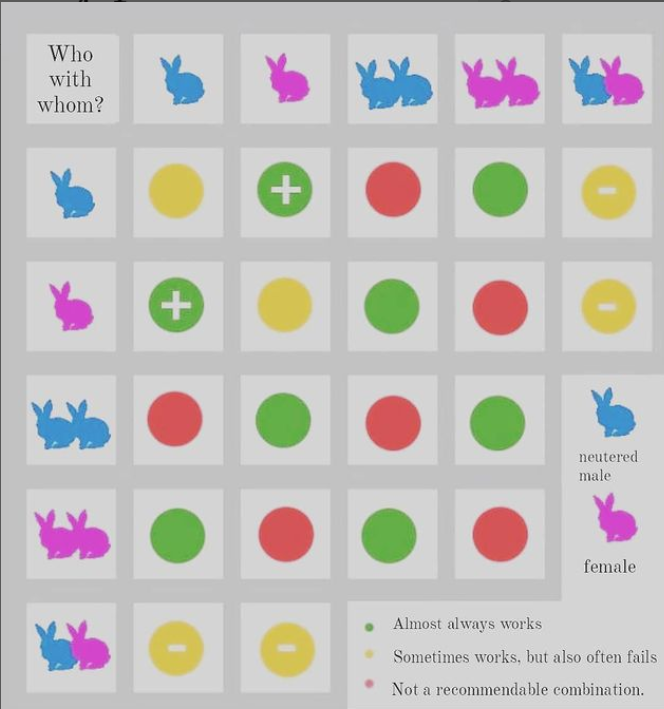
Unless one follows the rules of bonding rabbits accordingly and chooses the right partner, there are hardly ever any incompatibilities.
In case it does happen, it does not mean that any of the rabbits is generally incompatible to other. Most likely, another rabbit would be a better partner.
“My rabbit bit/hurt another rabbit”

There are many reasons which lead to rabbits biting each other. However, the main reasons are:
- A confined cage (Locking away in cages or hutches … Inform yourself regarding the proper enclosures – rabbits need the same space during nighttime!)
- Troubles within the rabbit group (See “which rabbits go along well”)
- Extremely bullied rabbits will fight back eventually
- Fights establishing a hierarchy
- Puberty, hormonal disbalance, phantom pregnancy
- Illnesses (The rabbit is in pain – for females often issues within the uterus Krankheiten)
- Spring time
- New hierarchy within the group (old rabbits move down, young rabbits move up the ladder)
- Re-Bonding after a separation
- Improper Re-Bonding
- Not-neutered Bucks (these have to be neutered in order to function within a group)
Most of the times, these factors lead to chasing and several issues have to add up, to provoke biting injuries. For example, when strange rabbits meet in one rabbit’s territory, or when a group is extremely disharmonious, badly paired engaging in fights over hierarchy in spring or an extremely bullied rabbit decides to fight back.
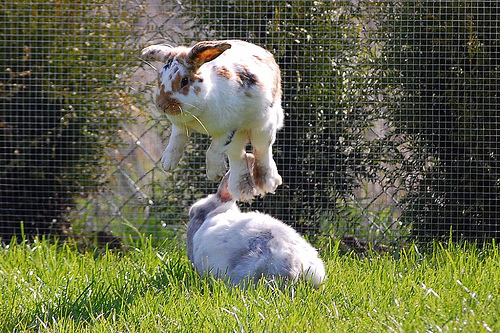
It is never a good solution, to keep a single rabbit! More so, the reasons for aggression should be eradicated, bonding should be done following the rules and an ideal environment should be created for the rabbits to live happily as a pair in company.
In our rescue station we often take in extremely incompatible rabbits, which hurt other rabbits badly or even killed it per biting, or for whom several bonding attempts failed, we are accustomed to very unsual cases. It ranges from extremly territorial rabbits, which immediately claim a neutral space as their own, via rabbits which have learned problematic social behavior, to rabbits with unnoticed illnesses, especially thymoma, lymphoma, and heart conditions, they are often not traceable even via a blood status. With proper medication and tricks for re-education, we managed to bond all of them.


